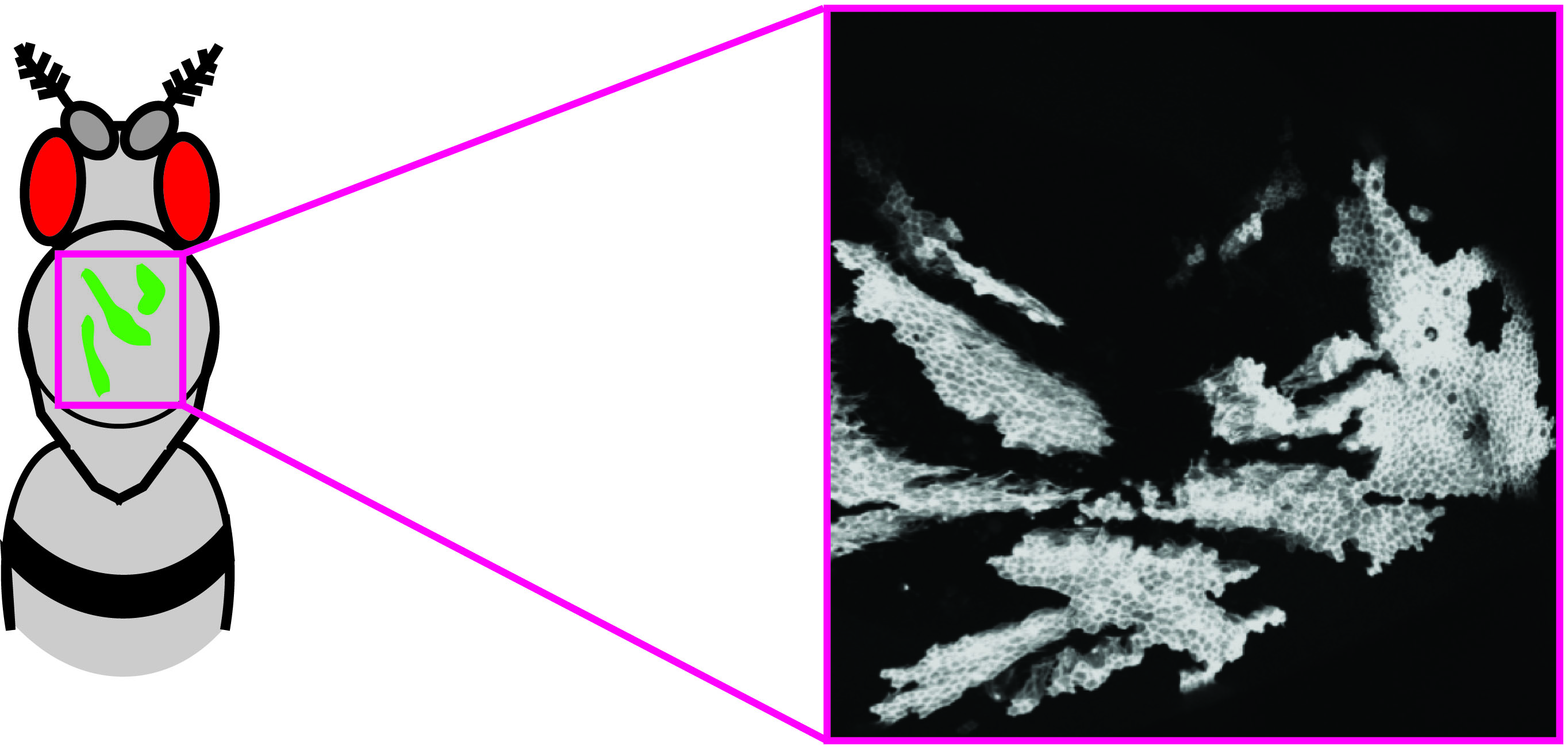Wednesday, 22 July 2020
Scientists from the University of Nottingham have taken a major step towards understanding how cancerous tumours can invade different areas of the body, which could be vital in helping to prevent millions of cancer-related deaths.
In the new research, published in the journal iScience, experts from the School of Life Sciences at the University used fruit flies to study tumour cell invasion. Invasion is a biological process where a cancerous tumour cell breaks off the primary tumour and penetrates the surrounding tissues. These cells may then go off to another part of the body and form a secondary tumour – a process known as metastasis.
Metastasis is the biggest killer in cancer. Over 90% of cancer deaths are caused not by the primary tumour, but by one or more secondary tumours.
This newly published study identified numerous genes that prevent invasion (called invasion suppressors). By identifying invasion suppressors, and by understanding how the process of invasion occurs, experts may be able to prevent or slow tumour progression toward malignancy in the future.
The research is part of the Fly Cancer Screen, a Cancer Research UK supported project, carried out by Dr Marios Georgiou and colleagues at the University of Nottingham, which uses the fruit fly to identify conserved genes that enhance or suppress tumour progression.
Many genes have been found to be frequently mutated in a variety of human cancers, but for the majority of these genes, it is not known whether these mutations affect tumour behaviour or disease progression in any way. Using the genetic amenability of the fly, scientists generated labelled tumours with specific gene mutations in the living animal and carried out a detailed systematic loss-of-function analysis.
 Labelled tumours with specific mutations were generated on the back of the living fly. In this way, mutations that affect tumour behaviour and disease progression could be identified.
Labelled tumours with specific mutations were generated on the back of the living fly. In this way, mutations that affect tumour behaviour and disease progression could be identified.
They generated a database with 33 different phenotypic categories, each describing a specific aspect of tumour behaviour. This allowed them to record a highly detailed analysis of how loss of an individual gene can affect tumour behaviour. This led to the identification of many genes that affect tumour behaviour in a wide variety of ways and thus offers a unique starting point to further investigate the molecular mechanisms of multiple aspects of tumour progression.
Dr Marios Georgiou, one of the authors of the study, said: “Metastasis is the leading cause of death for cancer patients, so it is imperative that we improve our understanding of the molecular mechanisms that underlie progression of tumour growth towards malignancy. Our latest findings are another step towards this."
To understand tumour transition to malignancy, and to develop new therapeutic strategies, these findings will be key to understanding the molecular basis of this event. This work enabled the discovery of functional cooperative regulators of invasion and the establishment of a network of conserved invasion suppressors, which will help to inform future research in this area.”
Story credits
The project was carried out over a number of years by a team of researchers at the Georgiou lab, University of Nottingham, School of Life Sciences.
Major contributions to the design and completion of the screen include: Brenda Canales Coutiño, Zoe E. Cornhill, Africa Couto, Natalie A. Mack, Alexandra D. Rusu, Usha Nagarajan, Yuen Ngan Fan, Marina R. Hadjicharalambous, Amy Burrows and Marios Georgiou, with additional technical support from Zsuzsa Markus.
More information is available from Dr Marios Georgiou from the School of Life Sciences at Marios.Georgiou@nottingham.ac.uk
Notes to editors:
About the University of Nottingham
Ranked 97 in the world and 17th in the UK by the QS World University Rankings, the University of Nottingham is a founding member of Russell Group of research-intensive universities. Studying at the University of Nottingham is a life-changing experience, and we pride ourselves on unlocking the potential of our students. We have a pioneering spirit, expressed in the vision of our founder Sir Jesse Boot, which has seen us lead the way in establishing campuses in China and Malaysia - part of a globally connected network of education, research and industrial engagement.
Nottingham was crowned Sports University of the Year by The Times and Sunday Times Good University Guide 2024 – the third time it has been given the honour since 2018 – and by the Daily Mail University Guide 2024.
The university is among the best universities in the UK for the strength of our research, positioned seventh for research power in the UK according to REF 2021. The birthplace of discoveries such as MRI and ibuprofen, our innovations transform lives and tackle global problems such as sustainable food supplies, ending modern slavery, developing greener transport, and reducing reliance on fossil fuels.
The university is a major employer and industry partner - locally and globally - and our graduates are the third most targeted by the UK's top employers, according to The Graduate Market in 2024 report by High Fliers Research. Alongside Nottingham Trent University, we lead the Universities for Nottingham initiative, a pioneering collaboration between the city’s two world-class institutions to improve levels of prosperity, opportunity, sustainability, health and wellbeing for residents in the city and region we are proud to call home. More news…